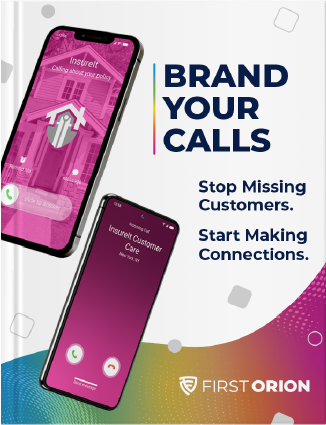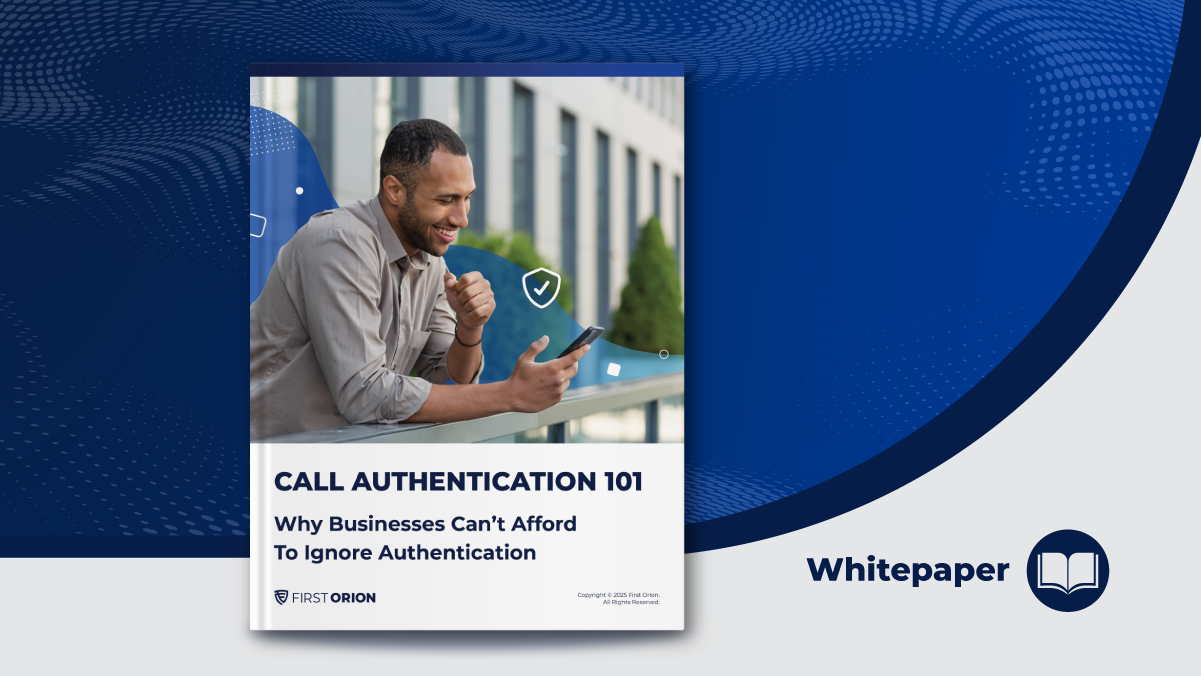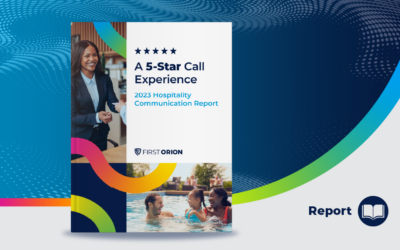Executive Summary
Voice remains the most powerful way to reach customers, but it’s also under attack. Robocalls, spoofing, and fraudulent activity have eroded trust in phone communications to the point where 87% of consumers no longer answer calls from numbers they don’t recognize1. For businesses, that reluctance to pick up translates into missed opportunities, strained customer relationships, and lost revenue.
First Orion’s Call Authentication is designed to change that narrative. By verifying that calls truly originate from businesses, authentication prevents spoofing, restores customer trust, and improves answer rates, transforming outbound calls from a liability into a powerful engagement tool.
In this paper, we cover:
- Why and how phone communication is broken
- How ignored calls lead to real-world costs
- What is Call Authentication and how it works
- How Call authentication integrates with branded calling
- Key business benefits
- The role of REST APIs
- Compliance and regulatory considerations
- Implementation process and timeline
- How success is measured
- Why leading enterprises choose First Orion
The State of Business Calling: Why It’s Broken
The volume of fraudulent and nuisance calls is staggering. In 2023 alone, robocall traffic exceeded 50 billion calls2, and consumers lost over $1.9 billion in phone scams in 2024, amounting to a median loss of $1,500 per person.3 It’s no surprise people ignore unknown calls.

Even legitimate organizations like banks, healthcare providers, and insurance companies are paying the price. When calls appear unverified or suspicious, customers hesitate to answer. And when scammers impersonate brands, the damage to trust can linger long after the attack ends. This impacts customer perception and creates real business costs. Missed calls mean lost revenue opportunities, increased expenses for repeat outreach and escalations, and the reputational harm of being associated, even mistakenly, with fraud.
What is Call Authentication and Why Does It Matter?
Call Authentication provides businesses with a way to prove their calls are legitimate. By working directly with the business, Call Authentication verifies the business as the calling party, the party they are calling, and the precise timeframe the call is made. When purchasing INFORM® Branded Calling or SENTRY® Call Blocking, this authentication process ensures that only legitimate calls receive branded display treatment, while spoofed calls are intercepted and blocked before reaching the customer. With First Orion’s INFORM® with Logo, authenticated calls get through and arrive with business identity clearly displayed, boosting reputation and restoring confidence in phone communication.
How Does it Work?
- Before a call is made, call information is securely transmitted from the business’s calling platform to First Orion.
- First Orion generates a unique key from portions of the call data. The key is given a Time to Live (TTL) value, ensuring security.
- The business initiates a call.
- The carrier network of the recipient requests call verification from First Orion, which checks if the call has a matching key.
- If a match is verified, the call receives the INFORM branded display. Calls without a match will not be branded.
Branded Calling vs. Call Authentication: What’s the Difference?
Branded Calling and Call Authentication complement each other but serve different purposes. Branded Calling adds context to outreach by showing business name, logo, and call reason to build recognition and trust. Call Authentication, on the other hand, is a feature focused on added security, validating calls through carrier networks and First Orion’s systems to ensure that they truly originate from organizations.
Used together, they provide a powerful one-two punch: Authentication secures the call, while branding humanizes and contextualizes it, so customers answer with confidence.

What is REST API?
With First Orion’s end-to-end Call Authentication solution, businesses integrate via rest API (representational state transfer application programming interface) to ensure that every call is secure and trusted from start to finish.
REST API is a way for different software systems to communicate with each other over the internet. It allows applications to send and receive data—usually in lightweight formats like JSON—through simple HTTP requests (GET, POST, PUT, DELETE).
REST APIs are flexible, scalable, and widely adopted because they let developers connect different platforms, services, and applications without needing to know the inner workings of each system. They are crucial for integrating voice, messaging, and data services into other applications. For example, a REST API can:
- Provision phone numbers or register new business lines automatically.
- Enable branded calling, caller ID management, and Call Authentication within existing systems.
- Access call data like analytics, logs, or customer interaction records for reporting.
- Automate workflows—such as routing calls, managing IVR menus, or sending SMS notifications.
Essentially, REST APIs make it easier for telecom providers, carriers, and businesses to connect their voice systems with CRMs, call centers, mobile apps, and enterprise platforms and streamlining operations, improving customer experience, and enabling new features like branded calling.
REST APIs: The Backbone of Authentication
REST APIs play a central role in delivering secure, authenticated calls to carriers, businesses, and consumers.
- API‑Driven Call Registration
When a business wants to brand or authenticate its outbound calls, First Orion’s REST APIs allow them to register their phone numbers and call campaigns directly with our system. This registration provides the context, like the business name, department, or reason for the call, needed to display verified information to the recipient. - Authentication & Validation
Once the numbers are registered, First Orion’s API framework communicates with carrier networks to validate that calls originate from authorized sources. This process prevents spoofing by ensuring that only legitimate calls tied to the registered business can display the branded information. - Real‑Time Branded Communication
Using REST APIs, First Orion sends call display details (business name, logo, and call reason) in real time to participating carriers. This creates a seamless, branded call experience on the recipient’s phone and turns what might have been an ignored or distrusted call into a verified, trusted interaction. - Analytics & Feedback Loops
Our APIs also provide access to detailed analytics—such as call answer rates, duration, and engagement—allowing businesses to measure the ROI of branded calling and continuously improve their strategies.
In short: REST APIs are the backbone of how First Orion integrates Call Authentication and branded communication into carrier networks and enterprise systems. They enable secure, verified, and context‑rich calls that protect consumers from spoofing while improving answer rates and customer trust for businesses.
Does it Integrate with Existing Phone Systems?
First Orion’s Call Authentication solution is carrier‑integrated and API‑driven, designed to work with most enterprise telephony environments, including on‑premise PBX (private branch exchange), cloud contact centers, and VoIP systems (voice over internet protocol), without requiring a complete infrastructure overhaul.
Is Authentication Required by Law?
For many businesses, yes. The FCC requires voice service providers to implement STIR/SHAKEN protocols for calls over IP networks to help prevent spoofing. While businesses themselves may not be directly regulated, using authenticated calling ensures compliance and tagged or blocked by carriers.
Can Authentication Work with Toll-Free, VoIP, and Local Numbers?
Yes. First Orion’s solution supports multiple number types—including local, toll‑free, and VoIP numbers—making it ideal for businesses with diverse outbound call strategies.
What is the Implementation Process and Timeline?
Implementation is straightforward and fast. Most businesses can be onboarded in a few weeks, depending on their infrastructure. Our team works directly with businesses IT or contact center teams to register numbers, integrate APIs, and test call flows before going live.
- Fast onboarding: Most businesses are up and running in a few weeks.
- Seamless integration: Works with on-premise PBX, cloud contact centers, and VoIP systems.
- Enterprise-ready: Supports thousands of numbers and millions of calls across multiple locations.
Why Businesses Can’t Afford to Wait
For many organizations, adopting Call Authentication is a necessity. The FCC requires service providers to implement STIR/SHAKEN protocols to combat call spoofing, and businesses that fail to authenticate their calls risk having them labeled or blocked by carriers.
And compliance is just one piece of the puzzle. The real value lies in measurable outcomes: higher answer rates, reduced operational inefficiencies from repeat outreach, and a restored sense of credibility with customers.
How to Measure Success
Success focuses on helping businesses clearly see the value it delivers. That’s why we provide robust analytics dashboards that go beyond surface‑level metrics. Businesses can track answer rates, call completion rates, call duration, first‑call resolution, and engagement trends to understand how authentication is impacting their outbound strategy.
These insights make it easy to compare performance before and after implementation, helping quantify the return on investment. But measuring success is a collaborative effort: we work closely with each client to define their key performance indicators (KPIs) based on their goals, whether it’s improving customer contact rates, reducing operational inefficiencies from repeat calls, or strengthening brand trust.
This partnership approach ensures that the metrics we track aren’t just numbers on a dashboard, but meaningful indicators of improved customer relationships and business outcomes.
The First Orion Advantage
Choosing First Orion means choosing a partner trusted by over 100 Fortune 500 companies and some of the world’s largest enterprises. Our deep carrier relationships, patented technology, and enterprise‑grade infrastructure make us the most reliable and scalable provider in the space.
But more than that, we offer a full-stack solution by combining visibility, reputation, and protection. No other provider delivers authentication, branded calling, and advanced analytics in one integrated platform.
Conclusion: Reclaiming the Voice Channel
In a world where customers ignore unknown calls and scammers exploit trusted brands, businesses can’t afford to rely on unverified communications. First Orion’s Call Authentication restores trust, ensuring calls are recognized as legitimate, secure, and worth answering. It reclaims the voice channel as a powerful engine for growth, engagement, and customer connection.
Sources
- First Orion data
- YouMail Robocall Index
- FCC report




